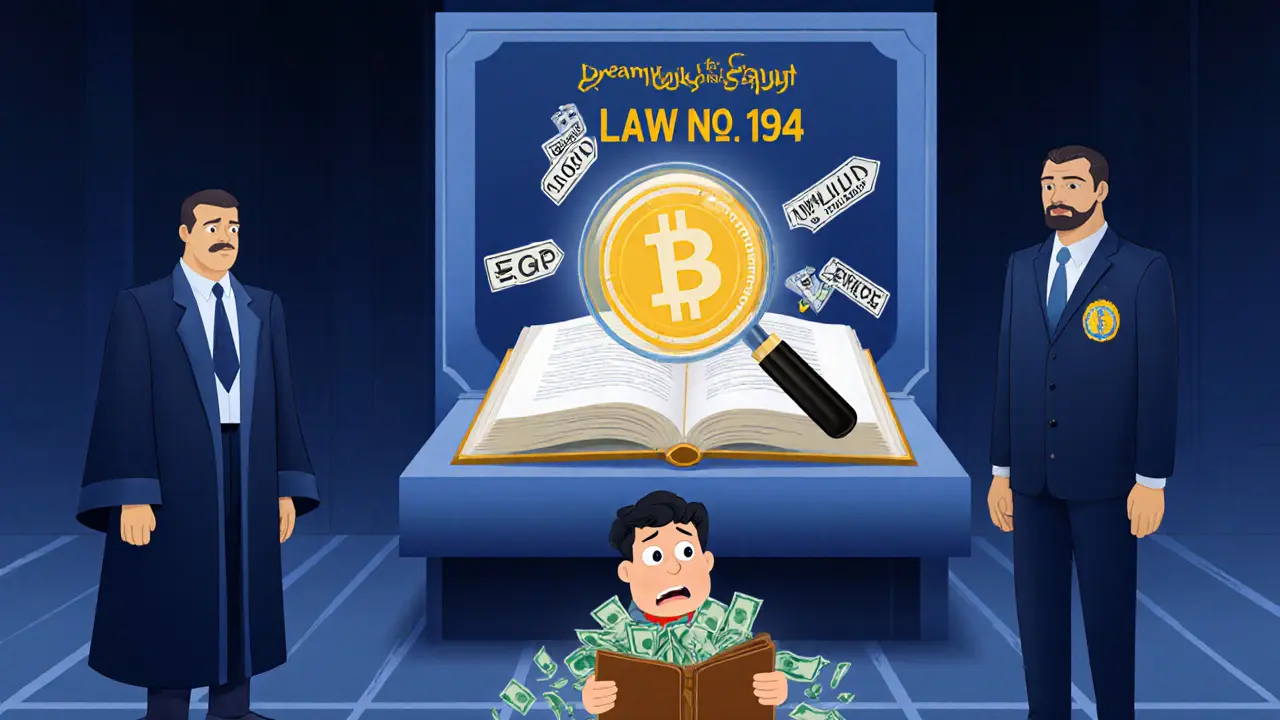Crypto Trading Fine Calculator
Potential Penalty
Fine Details:
Under Law No. 194 of 2020, Article 206, crypto-related activities are illegal and punishable by:
- Imprisonment (several years)
- Fines between 1 million to 10 million EGP (approx. $51,600-$516,000 USD)
These penalties reflect the government's strict stance against cryptocurrency due to financial stability and anti-money laundering concerns.
Ever wondered why an Egyptian trader could face a fine worth over half a million dollars for a single Bitcoin purchase? The answer lies in a set of draconian rules that treat any crypto activity as a criminal offense. Below you’ll find exactly how the fines are calculated, which laws enforce them, and what you should do if you’re caught buying, selling, or even promoting digital coins in Egypt.
Key takeaways
- The penalty range is1millionto10millionEgyptian pounds (≈$51,600‑$516,000USD).
- Law No.194 of2020, specifically Article206, makes crypto issuance, trading, promotion and exchange operation illegal.
- Both imprisonment and a fine can be imposed; the fine can be levied alone.
- The Central Bank of Egypt (CBE) and the Egyptian Financial Regulatory Authority (FRA) enforce the ban.
- Despite the crackdown, over 1.7million Egyptians still own crypto, according to a 2022 TripleA report.
What the law actually says
Law No.194 of 2020 is Egypt’s comprehensive cryptocurrency prohibition law. It criminalises the issuance, trading, promotion and operation of any cryptocurrency exchange. The core legal instrument is Article206 of that law, which explicitly defines the prohibited activities and outlines the penalty structure.
Violators face two parallel punishments:
- Imprisonment - the length varies but can be several years.
- A fine ranging from 1million Egyptian pounds to 10million Egyptian pounds.
The law does not allow a “choose one” option; prosecutors can impose both, or they may apply the fine alone if the court deems it sufficient.
Who enforces the ban?
The two main regulators are the Central Bank of Egypt (CBE) and the Egyptian Financial Regulatory Authority (FRA). Both agencies issue public warnings, monitor online platforms, and maintain reporting hotlines for citizens to flag illegal crypto solicitations.
The CBE repeatedly stresses that cryptocurrencies are “highly volatile, lack tangible backing, and are prone to money‑laundering and cyber‑piracy.” The FRA adds that any public offering of virtual assets without a capital‑market‑authority‑approved prospectus breaches Capital Market Law No.95 of 1992, Article4.
Fine amounts in real‑world terms
| Fine (EGP) | USD Approx. | Average Egyptian monthly salary (2024) | Impact level |
|---|---|---|---|
| 1,000,000 | $51,634 | ≈13,000EGP | ~77× monthly wage |
| 5,000,000 | $258,170 | ≈13,000EGP | ~385× monthly wage |
| 10,000,000 | $516,340 | ≈13,000EGP | ~770× monthly wage |
For context, the average Egyptian salary in 2024 hovered around 13kEGP per month (≈$670USD). Even the lowest fine equals more than six years of average earnings. That’s why the government treats crypto offences as serious financial crimes.

Why the ban isn’t stopping usage
Paradoxically, Egypt ranks second among Arab nations for crypto ownership. The TripleA 2022 report counted 1,791,185 crypto owners - about 1.75% of the population - despite the threat of prison and multi‑million‑pound fines.
Three factors explain the gap:
- Economic pressure: High inflation and a weak local currency push people toward assets they perceive as stores of value.
- Cross‑border remittances: Egyptians working abroad often receive money via crypto because traditional channels are costly.
- Enforcement limits: Monitoring every private wallet is technically challenging, so authorities focus on public promotions and exchange platforms.
In practice, most violations involve individuals buying on foreign exchanges, using VPNs, and keeping the activity off‑grid.
How the ban affects businesses
For companies that rely on fast, low‑cost international payments, the prohibition creates a logistical nightmare. Without crypto as a settlement rail, they must route transactions through banks that can be slow, charge high foreign‑exchange fees, and sometimes refuse to process payments linked to high‑risk jurisdictions.
This friction reduces Egypt’s attractiveness as a trade partner, especially for fintech startups that could otherwise leverage blockchain for supply‑chain tracking, identity verification, or micro‑finance.
What to do if you’re caught
If you receive a notice from the CBE or FRA, act quickly:
- Consult a lawyer: Criminal defense specialists familiar with Egyptian financial law can negotiate reduced penalties or arrange a plea.
- Preserve evidence: Keep transaction logs, exchange communications, and any proof that you acted in good faith (e.g., you thought the platform was licensed).
- Consider settlement: Paying the fine early may lead to a lighter sentence or avoid imprisonment altogether.
- Stop all crypto activity: Continued violations will only increase the penalties.
Remember, the law allows the court to impose either the fine or imprisonment, so a swift settlement can be a strategic move.
How to stay compliant in Egypt
Because the ban is absolute, the only safe path is to avoid any crypto‑related activity within Egyptian jurisdiction. Here are practical tips:
- Do not open accounts with unlicensed exchanges, even if they are based abroad.
- Avoid promoting crypto projects on social media or via messaging apps to Egyptian friends.
- Use only government‑approved financial channels for cross‑border transfers.
- If you work for an international firm, ensure the company’s operations in Egypt are strictly separated from any blockchain‑related services.
- Report suspicious crypto solicitations to the FRA’s hotline - it’s safer to be a whistle‑blower than a participant.
Future outlook
Globally, regulators are moving toward nuanced frameworks that tax, license, and supervise digital assets. Egypt, however, has doubled down on prohibition, citing financial stability and anti‑money‑laundering concerns.
Should a shift occur, it would likely start with a pilot licensing regime for “sandbox” projects, similar to what the United Arab Emirates and Saudi Arabia have tried. Until then, the 1‑10millionEGP fine remains the harshest deterrent in the region.

Frequently Asked Questions
What exact activities are prohibited under Law No.194 of2020?
The law bans the issuance of any cryptocurrency, buying or selling crypto on any platform, promoting crypto projects, operating a crypto exchange, and providing related services without explicit government permission.
Can I be fined if I only hold crypto in a foreign wallet?
Holding crypto alone is not explicitly criminalized, but acquiring it in the first place requires a prohibited transaction. If authorities can prove you purchased it, the fine applies.
How does the fine compare to other financial crimes in Egypt?
The 1‑10millionEGP range is among the highest for non‑violent financial offenses, reflecting the government’s view of crypto as a major risk to monetary stability.
Is there any legal way for Egyptians to invest in crypto?
At present, no. The only legal route would be through a licensed foreign entity that does not involve Egyptian residents directly. Any participation by a citizen inside Egypt breaches the law.
What should I do if I receive a warning from the FRA?
Treat it as a serious notice. Stop all crypto activity immediately, document the warning, and seek legal counsel to assess risk and possible settlement options.


Jenae Lawler
February 6, 2025 AT 07:07Although the prevailing discourse lauds the Egyptian prohibition of digital assets as a commendable safeguard of monetary sovereignty, one must acknowledge that such onerous penalties constitute an anachronistic overreach that starkly diverges from contemporary global financial integration standards.
Sophie Sturdevant
February 13, 2025 AT 16:54From a strategic compliance perspective, the zero‑tolerance enforcement model deployed by the authorities represents a high‑stakes risk‑mitigation framework; you should therefore recalibrate your operational posture to prioritize regulatory alignment, leveraging robust governance protocols to avoid punitive exposure.
Nathan Blades
February 21, 2025 AT 02:40Consider the broader ethical landscape: when a state imposes punitive measures that eclipse average earnings, it not only curtails financial autonomy but also raises profound questions about the balance between collective stability and individual liberty.
Somesh Nikam
February 28, 2025 AT 12:27Indeed, the disproportionate fine structure underscores a systemic imbalance; acknowledging this, one can still champion responsible financial stewardship while navigating the constraints-stay vigilant, and remember that knowledge empowers resilience 😊.
Debby Haime
March 7, 2025 AT 22:14Wow, those numbers are staggering! Imagine paying a fine that’s hundreds of times your monthly paycheck-no wonder crypto enthusiasts feel the heat.
emmanuel omari
March 15, 2025 AT 08:00The figures you cite simply reflect a sovereign government's rightful exercise of fiscal authority; external critics overlook the necessity of such stringent measures to preserve national economic integrity.
Andy Cox
March 22, 2025 AT 17:47the crypto ban kinda makes sense if you think about protecting the currency but it also pushes people to hidden channels
Courtney Winq-Microblading
March 30, 2025 AT 04:34Ah, the paradox of prohibition-while the state's intention is to shield the pound from volatility, the clandestine currents it spawns resemble an underground river, ever‑flowing beneath the surface, whispering of freedom and risk alike.
katie littlewood
April 6, 2025 AT 14:20When we examine the punitive framework imposed by Egypt, the first observation is the sheer magnitude of the financial burden relative to the average citizen's earnings. A fine of one million Egyptian pounds translates to roughly seventy‑seven months of a typical salary, a ratio that is almost unprecedented in civil regulatory contexts. This disparity is amplified when the maximum penalty of ten million pounds is considered, eclipsing the lifetime earnings of many individuals. Moreover, the statutory language offers little flexibility, allowing prosecutors to combine incarceration with monetary sanctions, thereby compounding the deterrent effect. The law’s categorical bans on buying, selling, promoting, and operating exchanges leave no legitimate avenue for engagement, effectively criminalizing a wide swath of financial behavior. While the government cites anti‑money‑laundering concerns, the blanket prohibition overlooks nuanced risk‑based approaches that many jurisdictions have successfully employed. In practice, enforcement tends to focus on public promotion and exchange platforms, yet the majority of transactions occur on offshore services that evade local scrutiny. Consequently, ordinary users who simply hold or acquire crypto through foreign exchanges remain vulnerable to punitive action if traced. The socioeconomic backdrop-characterized by high inflation and depreciating currency-further fuels the demand for alternative stores of value, creating a tension between policy intent and economic reality. In addition, the heavy fines serve as a revenue stream that could, paradoxically, incentivize corrupt practices within enforcement agencies. Critics argue that such draconian measures stifle innovation and drive talent abroad, undermining potential fintech development. Supporters, however, contend that a hard line is essential to maintain monetary stability in an already fragile economy. The paradox lies in the fact that the very assets the law seeks to suppress are often perceived as hedges against the instability the ban aims to protect. Internationally, we observe a trend toward regulated sandboxes rather than outright bans, suggesting that Egypt’s approach may be out of step with global best practices. Ultimately, the policy reflects a classic trade‑off between immediate control and long‑term competitiveness in the digital finance arena. Stakeholders, therefore, must weigh the immediate deterrent benefits against the broader implications for economic dynamism and individual financial freedom.
Chad Fraser
April 14, 2025 AT 00:07Hey, you’ve broken it down beautifully-bottom line is, if you’re in Egypt, steer clear of crypto right now or you could end up paying a fine that dwarfs your salary.
Jayne McCann
April 21, 2025 AT 09:54Honestly, banning crypto just drives it underground.
Richard Herman
April 28, 2025 AT 19:40While the underground shift is a real concern, fostering dialogue between regulators and innovators could pave a path toward balanced oversight rather than outright prohibition.
Parker Dixon
May 6, 2025 AT 05:27Here’s a quick cheat‑sheet: ✅ Average Egyptian monthly salary ≈ 13 k EGP; ✅ Minimum fine ≈ 1 M EGP (~77 × salary); ✅ Maximum fine ≈ 10 M EGP (~770 × salary); ✅ Imprisonment can accompany fines; ✅ No legal way to trade crypto locally. 📊💡
Stefano Benny
May 13, 2025 AT 15:14That summary oversimplifies a multifaceted regulatory regime; the real risk matrix includes AML compliance layers, cross‑border jurisdictional conflicts, and potential asset seizure protocols-don’t underestimate the systemic exposure. 🚨